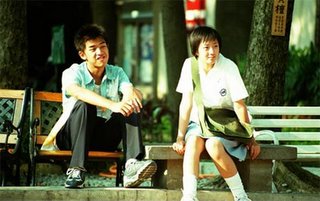Blue Gate Crossing

Blue Gate Crossing (dir. Chin-yen Yee), Taiwanese, 2002 - I'd rate it a 4 out of 5.
Available on amazon.com
I dislike recapping a movie's premiss, especially, when it's already been written for me.
So...from IMDB,
An is-she-or-isn't-she gay comedy focused on a Taiwanese teen, the boy she might like, and the girl she may love.
I've seen a couple of movies lately that I liked well enough, except for the endings. At Sundance recently, 'In Between Days'(reviewed below), and to a lesser extent 'The Science of Sleep'(Dir. Michel Gondry), and a few months before that it was 'Broken Flowers'(Dir. Jim Jarmusch, starring Bill Murray). I liked all these movies and it wasn't even necessarily that I didn't like their endings as much as I just didn't think there was an ending, that is to say, the conclusion of the film was not different enough from the rest of the film to set it apart. Forget about closure or resolve. I liked each of these movies well enough to forgive it but I still felt less than satisfied after the experience was over. I understand that life doesn't have endings either but is rather a collection of moments. However, we do in retrospect, draw a conclusion to those moments that transitions us from one dispensation to the next in our lives, and I believe good story-telling almost always has some definite conclusion that should likewise be drawn by it's narrative.
Blue Gate Crossing's ending is a perfect ending, in contrast to the films mentioned above. It's the kind of ending that just feels right. Not everything gets resolved and people go on with their lives much like before and the characters don't get what they wanted...but instead of ending with a tone of 'that's the film, and it's all over and done with cause life hurts and it sucks and this is what it's like', it manages to end on a note of optimism about the future, that there unknowns out there that may counter the the griefs of the past. It manages to somehow make, what should not be a happy ending, happy, in a zen-like acceptance kind of way.
Anyway, I didn't mean to spend so much time on endings but the ending in this particular film is crucial because it's the payoff and essentially makes the film work by lending an elegance to a coming of age story ...so moving on...

The rest of the movie carries nicely. It's playful and engrossing for the most part, tinged with a bit of the pain and hurt of love that comes with being a confused high school teen. The main character we follow is Meng Kerou(played by Lun-mei Guey). She's intriguing enough to carry the lead with the help and support of Lin Yuezhen(played by Shu-hui Liang) to bounce off of. The movie is very simplistic and cleanly shot. The setting is Taipei and it looks like a fascinating place which has a distinct character. I don't see many films from Taiwan but knowing there's people like Director Chin-yen Yee making films over there, makes me excited about seeing future productions from the R.O.C.
